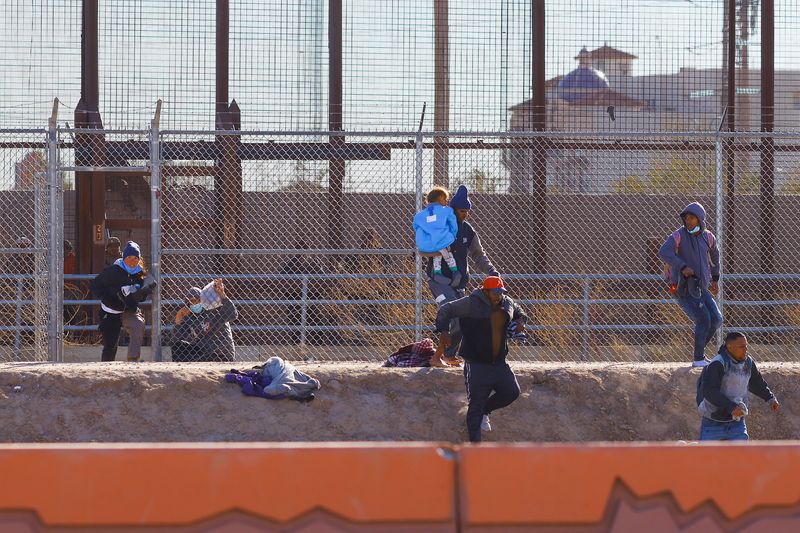
© Reuters. FILE PHOTO: Migrants run to hide from the U.S. Border Patrol and Texas State Troopers after crossing into the United States from Mexico, in El Paso, Texas, U.S., December 23, 2022. REUTERS/Jose Luis Gonzalez
2/5
By Nate Raymond
(Reuters) -The U.S. Supreme Court on Tuesday left in place for now a pandemic-era order allowing U.S. officials to rapidly expel migrants caught at the U.S.-Mexico border in order to consider whether 19 states could challenge the policy’s end.
The court on a 5-4 vote granted a request by a group of Republican state attorneys general to put on hold a judge’s decision invalidating the emergency public health order known as Title 42 while it considered whether they could intervene to challenge the ruling.
The states had argued lifting the policy could lead to an increase in already-record border crossings. The court said it would hear arguments over the policy in its February session. A ruling is expected by the end of June.
“It breaks my heart that we have to keep waiting,” Miguel Colmenares, a Venezuelan migrant in the Mexican border city of Tijuana, said on hearing about the court’s decision.
“I don’t know what I’m going to do, I haven’t got any money and my family’s waiting for me,” the 27-year-old said.
White House Press Secretary Karine Jean-Pierre said the Biden administration would respect the ruling, but added that Title 42 should not remain in place indefinitely.
“To truly fix our broken immigration system, we need Congress to pass comprehensive immigration reform measures,” she said.
Chief U.S. Supreme Court Justice John Roberts, a member of the court’s 6-3 conservative majority, on Dec. 19 issued a temporary administrative stay maintaining Title 42 while the court considered whether to keep the policy in place for longer. The policy had prior to his order been set to expire on Dec. 21.
Conservative Justice Neil Gorsuch joined with the court’s three liberal members – Justices Sonia Sotomayor, Elena Kagan and Ketanji Brown Jackson – in dissenting from Tuesday’s order, which Gorsuch called “unwise.”
He questioned why the court was rushing to hear a dispute related to “emergency decrees that have outlived their shelf life,” and said the only plausible reason was because the states contended Title 42 would help mitigate against an “immigration crisis.”
“But the current border crisis is not a COVID crisis,” Gorsuch wrote in an opinion joined by Jackson. “And courts should not be in the business of perpetuating administrative edicts designed for one emergency only because elected officials have failed to address a different emergency.”
Title 42 was first implemented in March 2020 under Republican former President Donald Trump at the beginning of the COVID-19 pandemic.
U.S. President Joe Biden, a Democrat, kept the restrictions in place for more than a year after taking office in 2021 despite promising to shift away from Trump’s hardline immigration policies.
U.S. Border Patrol agents apprehended a record 2.2 million migrants at the southwest border in the 2022 fiscal year, which ended Sept. 30. Close to half of those arrested were rapidly expelled under Title 42.
The Biden administration sought to lift Title 42 after U.S. health authorities said in April the order was no longer needed to prevent the spread of COVID-19, but were blocked by a federal judge in Louisiana – a Trump appointee – in response to a Republican-led legal challenge.
Enrique Lucero, director of migration affairs in Tijuana, said it was “absurd” that Title 42 remained in place, noting the city had a large backlog of U.S. asylum seekers.
“This measure has to disappear sooner or later,” he said.
A group of asylum-seeking migrants represented by the American Civil Liberties Union (ACLU) had sued the U.S. government over the policy, arguing the expulsions to Mexico exposed them to serious harms, like kidnapping or assaults.
In that case, U.S. District Judge Emmet Sullivan in Washington, D.C., sided with the migrants on Nov. 15 and ruled Title 42 was unlawful.
Sullivan, an appointee of Democratic former President Bill Clinton, said the government failed to show the risk of migrants spreading COVID-19 was “a real problem.” He said the government also failed to weigh the harm asylum seekers would face from the Title 42 order.
The Biden administration sought time to prepare for the end of the policy, at which point migrants would be able to once again, as they had pre-pandemic, be allowed to request asylum at the border. Sullivan gave it until Dec. 21.
Unhappy with the lower court’s decision, a group of Republican state attorneys general sought to intervene to keep defending the policy in court. When a federal appeals court on Dec. 16 declined to allow them to intervene and put Sullivan’s order on hold, they took the matter to the Supreme Court.
“It’s disappointing the Biden administration is willing to sacrifice the safety of American families for political purposes,” said Republican Arizona Attorney General Mark Brnovich, who is leading the defense of Title 42.